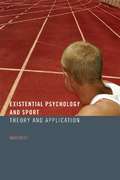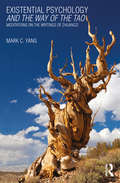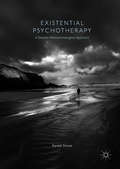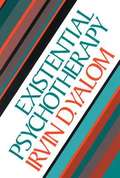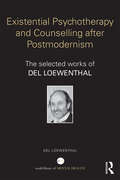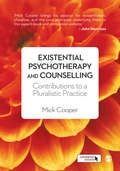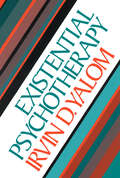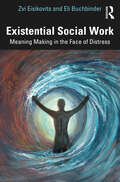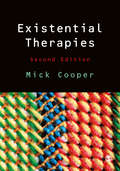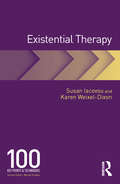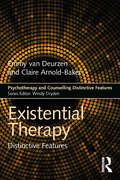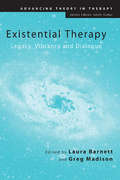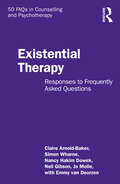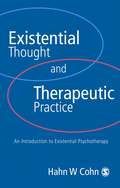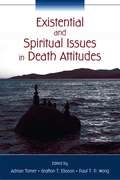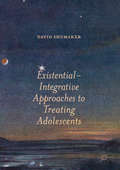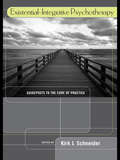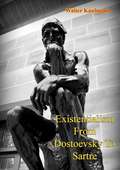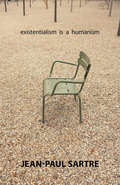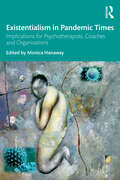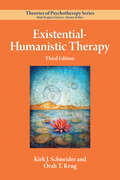- Table View
- List View
Existential Psychology and Sport: Theory and Application
by Mark NestiIncreasing numbers of professional teams and athletes look for assistance with the psychological factors of their performance, and there exists a growing body of professional sport psychologists ready to provide support. Despite this, it seems at times there remains a significant gap between the real needs of sport performers and what is delivered by traditional sport psychology. The existential approach described by Mark Nesti offers a radical alternative to the cognitive and cognitive-behavioural approaches that have dominated sport psychology, and represents the first systematic attempt to apply existential psychological theory and phenomenological method to sport psychology. This much-needed alternative framework for the discipline of applied sport psychology connects to many of the real and most significant challenges faced by sports performers during their careers and beyond. Existential Psychology and Sport outlines an approach that can be used to add something of depth, substance and academic rigour to sport psychology in applied settings beyond the confines of MST and good listening skills.
Existential Psychology and the Way of the Tao: Meditations on the Writings of Zhuangzi
by Mark C. YangIn ancient China, a revered Taoist sage named Zhuangzi told many parables. In Existential Psychology and the Way of the Tao, a selection of these parables will be featured. Following each parable, an eminent existential psychologist will share a personal and scholarly reflection on the meaning and relevance of the parable for psychotherapy and contemporary life. The major tenets of Zhuangzi's philosophy are featured. Taoist concepts of emptiness, stillness, Wu Wei (i.e. intentional non-intentionality), epistemology, dreams and the nature of reality, character building in the midst of pain, meaning and the centrality of relationships, authenticity, self-care, the freedom that can come from one's willingness to confront death, spiritual freedom, and gradations of therapeutic care are topics highlighted in this book.
Existential Psychotherapy
by Daniel SousaThis book presents a genetic-phenomenological approach of existential psychotherapy, articulating its theoretical underpinnings with principles supported by scientific evidence and concluding with clinical examples. The volume also offers a clear perspective about the relational stances and the therapeutic interventions of existential psychotherapy and how both can be combined and applied in the clinical practice. It begins with an overview and update on psychotherapy research, from which a set of therapeutic principles are drawn. It then conceptualizes the theoretical underpinnings of the genetic-phenomenological approach, based on three main aspects: inner-time consciousness, the experiential self, and the passive synthesis theory. It concludes with practical examples of case conceptualizations and clinical cases. This work is particularly relevant for trainees, students, and professionals of clinical psychology and psychotherapy, but also other mental health professionals that work in the area of the psychological and psychotherapeutic interventions.
Existential Psychotherapy
by Irvin D. YalomExistential therapy has been practiced and continues to be practiced in many forms and situations throughout the world. But until now, it has lacked a coherent structure, and analysis of its tenets, and an evaluation of its usefulness.
Existential Psychotherapy and Counselling after Postmodernism: The selected works of Del Loewenthal (World Library of Mental Health)
by Del LoewenthalDel Loewenthal's career has been wide-ranging, spanning existentialism, psychoanalysis, critical psychotherapy, humanism, postmodernism, phototherapy, cognitive behaviour therapy and childhood studies. This collection combines new and recent works with earlier writings, drawing together his outstanding research and contribution to existential theory, practice and research. Containing chapters and papers chosen by Loewenthal himself, the book is divided into the following sections: • Existentialism after postmodernism and the psychological therapies • Practice, ideologies and politics: Now you see it, now you don’t! • Practice, practice issues and the nature of psychotherapeutic knowledge • Practice and theory: Implications not applications • Thoughtful practice and research • Conclusion: Hopefully unending, continually changing and astonishing After an introduction to the overall book, each section is accompanied by the author's exploration of his further thoughts on the pieces, his own subsequent learning and his comments on developments in the field since the time of writing. Existential Psychotherapy and Counselling after Postmodernism will be inspiring reading for psychotherapists, psychoanalysts, counsellors, other mental health professionals in general, and existential therapists in particular.
Existential Psychotherapy and Counselling: Contributions to a Pluralistic Practice
by Mick CooperThis book is for trainees and practitioners across the orientations who wish to incorporate an existential approach into their practice. Using a pluralistic perspective that recognises the diversity of clients and their individual needs, it shows trainees how and when existential concepts and practices can be used alongside other approaches. A wealth of resources and the author's writing style make this is one of the most accessible and inspiring introductions to existential therapy. Videos of existential counselling in practice and written case studies ensure existential theory is illustrated in practice, while reflective questions and exercises help trainees relate notoriously complex existential themes to their own knowledge and experience. A companion website offers relevant journal articles, video tutorials on existential counselling skills, the results of the author's survey of the 'Top 10' existential films, novels and songs, and much more. This passionate and insightful book is the ideal guide to help your trainees understand existential therapy and learn how to integrate its ideas and practices into their therapeutic work. Mick Cooper is Professor of Counselling Psychology at University of Roehampton.
Existential Psychotherapy and Counselling: Contributions to a Pluralistic Practice
by Professor Mick CooperThis book is for trainees and practitioners across the orientations who wish to incorporate an existential approach into their practice. Using a pluralistic perspective that recognises the diversity of clients and their individual needs, it shows trainees how and when existential concepts and practices can be used alongside other approaches. A wealth of resources and the author’s writing style make this is one of the most accessible and inspiring introductions to existential therapy. Videos of existential counselling in practice and written case studies ensure existential theory is illustrated in practice, while reflective questions and exercises help trainees relate notoriously complex existential themes to their own knowledge and experience. A companion website offers relevant journal articles, video tutorials on existential counselling skills, the results of the author’s survey of the ‘Top 10’ existential films, novels and songs, and much more. This passionate and insightful book is the ideal guide to help your trainees understand existential therapy and learn how to integrate its ideas and practices into their therapeutic work. Mick Cooper is Professor of Counselling Psychology at University of Roehampton.
Existential Psychotherapy: (instructor's Version)
by Irvin D. YalomThe definitive account of existential psychotherapy.Existential therapy is practiced throughout the world. But until now, it has lacked a coherent structure. In Existential Psychotherapy, Irvin Yalom finds the essence of existential psychotherapy, synthesizing its historical background, core tenets, and usefulness to the practice.Organized around what Yalom identifies as the four "ultimate concerns of life" -- death, freedom, isolation, and meaninglessness -- the book takes up the meaning of each existential concern and the type of conflict that springs from our confrontation with each. He shows how these concerns are manifested in personality and psychopathology, and how treatment can be helped by our knowledge of them.Drawing from clinical experience, empirical research, philosophy, and great literature, Yalom provides an intellectual home base for those psychotherapists who have sensed the incompatibility of orthodox theories with their own clinical experience, and opens new doors for empirical research. The fundamental concerns of therapy and the central issues of human existence are woven together here as never before, with intellectual and clinical results that will surprise and enlighten all readers.
Existential Sexuality: Choosing to Love
by Peter KoestenbaumA comprehensive book about how you can apply the insights of existential psychotherapy and existential philosophy to human loving relationships.
Existential Social Work: Meaning Making in the Face of Distress
by Zvi Eisikovits Eli BuchbinderThis book is a theoretical and practical guide for mental health professionals who wish to utilize existential principles in their social work and clinical practice. Existential questions concerning life situations, such as anxiety, suffering, choosing, authenticity, are at the heart of the craft of any helping profession. The book aims to confront students and practitioners with the need to be simultaneously philosophical and experiential in their clinical approach. Written in an accessible tone, Eisikovits and Buchbinder bridge existential-philosophical concepts often seen as removed from everyday practice and the practical concerns of therapy. Each chapter presents a concept from existential philosophical tradition, such as anxiety, meaning making, time, and space, and then demonstrates their use by drawing from real-life clinical examples and interventions. The book illustrates their implementation in social work practice with reference to values such as client participation, self-determination, and free will. The book is intended for courses and advanced training in existential social work and therapy. It is essential reading for training social workers, counselors, therapists, and other helping professionals interested in existentialism.
Existential Therapies
by Mick Cooper`This book achieves what it sets out to do: "to introduce readers to the rich tapestry of existential therapeutic approaches". I found it concise and easy to read, despite the fact that it deals with some fairly complex ideas'' - CounsellingResource. com `One can only applaud the bravery of an author who gently send up Kierkegaard''s wilful obscurantism and cleans out the acrid smoke of Gauloises from the room. With welcome clarity and sanity, Mick Cooper efficiently lays out the concepts, techniques and directions adopted by several key figures in the broad field of existentially informed psychotherapy. In an excellent first chapter, Mick Cooper pointed out my `ontic'' from my `ontological''; and I could see, behind the long-words-with-dashes, the true resonance of these ideas with real human and therapeutic issues, dilemmas and goals'' - Clinical Psychology `This book proves to be a real treasure chest: what you always wanted to know about existential psychotherapy but failed to find anywhere else in such a comprehensive, clear and concise manner. In that sense, this publication provides a missing link. One merit of the book is its systematic structure. As extensive, and in part as heterogeneous as existential philosophy and therapy also maybe, Mick Cooper had nevertheless been able to build convincing clusters with, on the one hand, an enormous understanding of details and, on the other, a far-sightedness that, like a map, provides orientation in the diversity of existential therapy. I really appreciate this publication and can recommend it very strongly'' - Person-Centred and Experiential Psychotherapies `Existential Therapies will I suspect, suddenly make "existentialism" come alive. The author, Mick Cooper loves his subject, it fascinates and enthrals him, and we get to experience some of that, even though the book is "academic". The connections and overlaps with person-centred psychology are there for us to be, but so are the differences'' - Person-Centred Practice `As an overview of a number of different existential therapies the book is extremely welcome and manages in a relatively short space to cover a wide arena. Overall I rate the book highly. To pull together a large and somewhat disparate literature, then make sense of it and finally retains the reader''s interest, is difficult'' - Existential Analysis `Mick Cooper has done an impressive job in writing a much needed, current and user friendly survey of the field of existential therapies. If I were to teach this course, I would use this book. I applaud Mick Cooper for having admirably achieved the aim he set out to achieve. All this makes Mick Cooper''s book a must-read for anyone wishing to explore the topic of existential therapy'' - Society for Laingian Studies Website `What makes this book unique is that all the different strands of Existential philosophy are always clearly linked to practice'' - Counselling and Psychotherapy Journal `This is a very fresh book, not treading well-worn paths and genuinely informing us about a small but important field. This is really an indispensable book for anyone who wants to understand existentialist approaches to therapy'' - Self and Society `This publication marks a milestone providing an excellent, clear and critical overview of the contrasting forms of the approach as it is currently practised'' - Emmy van Deurzen, New School of Psychotherapy and Counselling, Schiller University, London `This is a book of superb thoroughness and scholarship - an unprecedented guide to existential therapy''s chief positions and controversies'' - Kirk J Schneider, President of the Existential-Humanistic Institute, USA `Combines scholarship with a writing style that makes difficult concepts accessible. This book should be required reading on any course where the existential tradition plays a part, and that includes person-centred courses and all sympathetic to the idea that psychotherapy is, in essence, a human encounter where warmth, understanding and a deep respect for the individual are key values'' - Tony Merr...
Existential Therapies
by Mick CooperWhat does it mean to practice therapy in an existential way? What are the different existential approaches? What are their strengths and limitations? Focusing on practical, face-to-face work with clients, the book introduces students to six existential therapies, highlighting areas of commonality and difference, and discusses key figures and their contributions, including Yalom, van Deurzen, Spinelli, Frankl and Laing. It outlines the critical perspectives and key debates, and presents implications for practice, reflection and further reading. Fully updated to reflect current issues, this book now includes: · Sections presenting research evidence for each approach · An extended case study running through the book, demonstrating how different therapies might approach the same case · Chapter overviews, questions for reflection, and additional case studies of actual existential practice.
Existential Therapies
by Professor Mick CooperWhat does it mean to practice therapy in an existential way? What are the different existential approaches? What are their strengths and limitations? Focusing on practical, face-to-face work with clients, the book introduces students to six existential therapies, highlighting areas of commonality and difference, and discusses key figures and their contributions, including Yalom, van Deurzen, Spinelli, Frankl and Laing. It outlines the critical perspectives and key debates, and presents implications for practice, reflection and further reading. Fully updated to reflect current issues, this book now includes: · Sections presenting research evidence for each approach · An extended case study running through the book, demonstrating how different therapies might approach the same case · Chapter overviews, questions for reflection, and additional case studies of actual existential practice.
Existential Therapy: 100 Key Points and Techniques (100 Key Points)
by Susan Iacovou Karen Weixel-DixonLess of an orientation and more a way of understanding the challenges of being human, existential therapy draws on rich and diverse philosophical traditions and ways of viewing the world. Traditionally it has been seen as difficult to summarise and comprehend and the air of mystery surrounding existential ideas has been exacerbated by the dense language often used by philosophers and practitioners. Existential Therapy: 100 Key Points and Techniques provides a comprehensive and accessible guide to a fascinating and exciting body of knowledge, and the therapeutic approach it informs. Divided into five parts the topics covered include: Existentialism – inception to present day Theoretical assumptions Existential phenomenological therapy in practice Ethics and existential therapy Bringing it all together Existential Therapy: 100 Key Points and Techniques will be essential reading for all trainee and qualified counsellors, psychotherapists, psychologists and psychiatrists who want to use the wisdom of existential ideas in their work with clients. It will also benefit clients and potential clients who want to find out how existential ideas and existential therapy can help them explore what it means to be alive.
Existential Therapy: Distinctive Features (Psychotherapy and Counselling Distinctive Features)
by Claire Arnold-Baker Emmy van DeurzenExistential Therapy: Distinctive Features offers an introduction to what is distinctive about this increasingly popular method. Written by two practicing existential psychotherapists, with many years’ experience, it provides an accessible, bitesize overview of this increasingly used psychological therapy. Using the popular Distinctive Features format, this book describes 15 theoretical features and 15 practical techniques of Existential Therapy. Existential Therapy will be a valuable source for for psychotherapists, clinical, health and counselling psychologists, counsellors, psychiatrists, and all who wish to know more about the existential approach.
Existential Therapy: Legacy, Vibrancy and Dialogue (Advancing Theory in Therapy)
by Laura Barnett Greg MadisonIn 1958 in their book Existence, Rollo May, Henri Ellenberger and Ernst Angel introduced existential therapy to the English-speaking psychotherapy world. Since then the field of existential therapy has moved along rapidly and this book considers how it has developed over the past fifty years, and the implications that this has for the future. In their 50th anniversary of this classic book, Laura Barnett and Greg Madison bring together many of today's foremost existential therapists from both sides of the Atlantic, together with some newer voices, to highlight issues surrounding existential therapy today, and look constructively to the future whilst acknowledging the debt to the past. Dialogue is at the heart of the book, the dialogue between existential thought and therapeutic practice, and between the past and the future. Existential Therapy: Legacy, Vibrancy and Dialogue, focuses on dialogue between key figures in the field to cover topics including: historical and conceptual foundations of existential therapy perspectives on contemporary Daseinanalysis the search for meaning in existential therapy existential therapy in contemporary society. Existential Therapy: Legacy, Vibrancy and Dialogue explores how existential therapy has changed in the last five decades, and compares and contrasts different schools of existential therapy, making it essential reading for experienced therapists as well as for anyone training in psychotherapy, counselling, psychology or psychiatry who wants to incorporate existential therapy into their practice.
Existential Therapy: Responses to Frequently Asked Questions (50 FAQs in Counselling and Psychotherapy)
by Simon Wharne Neil Gibson Claire Arnold-Baker Emmy van Deurzen Nancy Hakim Dowek Jo MolleIn Existential Therapy: Responses to Frequently Asked Questions, the authors address those questions most frequently asked by potential clients of existential therapy or by people beginning their training or by those interested in counselling or psychotherapy. The book is divided into five parts, with each focusing on responding to questions about different elements of existential theory and its practice and applications: • Part 1: Existential philosophy • Part 2: Existential method and theory • Part 3: Existential skills and practice • Part 4: Existential applications in different contexts • Part 5: Existential relevance to everyday life The Q&A format, presented in accessible language, emphasises commonly unknown or misunderstood areas that are typically overlooked. The book will appeal to a wide audience of potential clients and trainees, practitioners from other approaches, and those outside of the profession who are curious to understand more about existential therapy.
Existential Thought and Therapeutic Practice: An Introduction to Existential Psychotherapy (Clinical And Counseling Ser.)
by Hans W. Cohn`A lucid and much-needed account of existential psychotherapy. . . As well as locating existential psychotherapy within a historical and philosophical context, Hans W Cohn encompasses various therapeutic issues and provides some vivid and sensitive passages of case material. . . I found the book provided a concise and clarifying account of the underlying philosophy and of the psychotherapeutic practice. . . The existentialist challenge to Freud outlined in the book provides an alternative point of view to counter potentially engulfing aspects of a psychoanalytic vision. This is a stimulating book which is a valuable contribution towards dialogue between different approaches of psychotherapy' - International Journal of Psychotherapy `If you want at least one "existential psychotherapy" text in your library, buy this one. It's a winner' - The Psychotherapy Review The theoretical framework used by many counsellors and psychotherapists is predominantly `psychodynamic', rooted in psychoanalytic theory and frequently felt to be inadequate for an understanding of the many-shaded spectrum of disturbances experienced by clients. Although many practitioners have discovered existential-phenomenological thought, they may wonder what relevance these philosophical ideas have to their actual practice, to their day-to-day meetings with clients and to the relation between client and therapist. There is often a divide between thought and practice, and this book bridges that gap. The author introduces the history and ideas of existential phenomenology and existential psychotherapy, and shows how therapeutic phenomena familiar to all therapists and counsellors can be understood from an existential viewpoint. Hans W Cohn also demonstrates how the existential approach opens up access to issues that other therapeutic orientations have neglected, such as the difficulty of choice, the burden of responsibility and the inevitability of death. The existential approach is constantly compared to the relevant psychodynamic counterpart, so that readers can assess the unfamiliar against a background of the more familiar.
Existential and Spiritual Issues in Death Attitudes
by Adrian Tomer • Grafton T. Eliason • Paul T. P. WongExistential and Spiritual Issues in Death Attitudes provides: an in-depth examination of death attitudes, existentialism, and spirituality and their relationships; a review of the major theoretical models; clinical applications of these models to issues such as infertility, bereavement, anxiety, and suicide; and an introduction to meaning managemen
Existential-Integrative Approaches to Treating Adolescents
by David ShumakerThis book frames how existential theory and intervention strategies can be seamlessly integrated with evidenced-based approaches when treating adolescents. This groundbreaking text begins with an overview of EI theory and provides an exhaustive review of risk and protective factors that contribute to an adolescent's experience of existential anxiety. Other book highlights include a proposed developmental model of existential anxiety in adolescence, and individual chapters devoted to working with adolescents who present with anxiety, depression, substance abuse concerns, and disruptive behaviors. Rich case study descriptions enrich this exciting and impactful approach with empirical support.
Existential-Integrative Psychotherapy: Guideposts to the Core of Practice
by Kirk J. SchneiderExistential-Integrative Psychotherapy promises to be a landmark in the fields of psychotherapeutic theory and practice. A comprehensive revision of its predecessor, The Psychology of Existence, co-edited by Kirk Schneider and Rollo May, Existential-Integrative Psychotherapy combines clear and updated guidelines for practice with vivid and timely case vignettes. These vignettes feature the very latest in both mainstream and existential therapeutic integrative application, by the top innovators in the field. The book highlights several notable dimensions: a novel and comprehensive theory of integrative existential practice; a premium on mainstream integrations of existential theory as well as existential-humanistic integrations of mainstream theory; a focus on integrative mainstream as well as existential-humanistic practitioners, students, and theorists; a discussion of short-term and cognitive-behavioral existential-integrative strategies; a focus on ethnic and diagnostic diversity, from case studies of multicultural populations to vignettes on gender, sexuality, and power, and from contributions to the treatment of alcoholism to those elucidating religiosity, psychoses, and intersubjectivity.
Existentialism From Dostoevsky To Sartre: Basic Writings Of Existentialism By Sartre, Kierkegaard, Nietzsche, Kafka, Heidegger, And Others
by Walter KaufmannWhat is Existentialism? It is perhaps the most misunderstood of modern philosophic positions--misunderstood by reason of its broad popularity and general unfamiliarity with its origins, representatives, and principles.Existential thinking does not originate with Jean Paul Sartre. It has prior religious, literary, and philosophic origins. In its narrowest formulation it is a metaphysical doctrine, arguing as it does that any definition of man's essence must follow, not precede, an estimation of his existence. In Heidegger, it affords a view of Being in its totality; in Kierkegaard an approach to that inwardness indispensable to authentic religious experience; for Dostoevsky, Kafka, and Rilke the existential situation bears the stamp of modern man's alienation, uprootedness, and absurdity; to Sartre it has vast ethical and political implications.Walter Kaufmann, author of Nietzsche, is eminently qualified to present and interpret the insights of existentialism as they occur and are deepened by the major thinkers who express them.In every case complete selections or entire works have been employed: The Wall, Existentialism, and the complete chapter on "Self-Deception" from L'être et le Néant by Sartre; two lectures from Jaspers' book Reason and Existenz; original translations of On My Philosophy by Jaspers and The Way Back into the Ground of Metaphysics by Heidegger. There is, as well, material from Dostoevsky, Kierkegaard, Nietzsche, Rilke, and Camus.
Existentialism Is a Humanism
by Jean-Paul SartreA new translation of two seminal works of existentialism It was to correct common misconceptions about his thought that Jean-Paul Sartre, the most dominent European intellectual of the post-World War II decades, accepted an invitation to speak on October 29, 1945, at the Club Maintenant in Paris. The unstated objective of his lecture (“Existentialism Is a Humanism”) was to expound his philosophy as a form of “existentialism,” a term much bandied about at the time. Sartre asserted that existentialism was essentially a doctrine for philosophers, though, ironically, he was about to make it accessible to a general audience. The published text of his lecture quickly became one of the bibles of existentialism and made Sartre an international celebrity. The idea of freedom occupies the center of Sartre’s doctrine. Man, born into an empty, godless universe, is nothing to begin with. He creates his essence—his self, his being—through the choices he freely makes (“existence precedes essence”). Were it not for the contingency of his death, he would never end. Choosing to be this or that is to affirm the value of what we choose. In choosing, therefore, we commit not only ourselves but all of mankind. This book presents a new English translation of Sartre’s 1945 lecture and his analysis of Camus’s The Stranger, along with a discussion of these works by acclaimed Sartre biographer Annie Cohen-Solal. This edition is a translation of the 1996 French edition, which includes Arlette Elkaïm-Sartre’s introduction and a Q&A with Sartre about his lecture.
Existentialism in Pandemic Times: Implications for Psychotherapists, Coaches and Organisations
by Monica HanawayBuilding on Monica Hanaway’s previous publications, this timely volume considers the benefits of bringing an existential approach to psychotherapy, coaching, supervision and leadership, particularly in times of crisis. The book uses an existential lens to examine the impact Covid-19 has had on our mental health and ways of being, making connections between situations that challenge our mental resources and the unique ways existential ideas can address those challenges. Featuring contributions from renowned existential thinkers and practitioners, the book connects personal experiences with clinical examples and philosophic ideas to explore concepts like anxiety, relatedness and uncertainty as they relate to key existential themes, helping to inform coaches and therapists in their work with clients. Existentialism in Pandemic Times is important reading for coaches, therapists, psychologists and business leaders, as well as for scholars and researchers interested in applied philosophy.
Existential–Humanistic Therapy (Theories of Psychotherapy Series®)
by Kirk J. Schneider Orah T. KrugThis third edition offers an updated primer to the theory, history, research, and practice of existential–humanistic (EH) therapy, which merges existential philosophy with humanistic psychotherapy. EH therapy blends the European heritage of self-inquiry, struggle, and responsibility with the American tradition of spontaneity, optimism, and practicality. This book helps therapists and trainees understand how to help people address critical life questions and attune to how clients relate to themselves and to others, appropriately reflecting back aspects of themselves that are evident but unnoticed. New to this edition are significant updates to research and theory, including the work of Otto Rank, an often-overlooked pioneer in EH therapy, and new concepts like existential unconsciousness and life-enhancing anxiety. The cultivation of presence as a central component of the therapeutic relationship is also emphasized.
